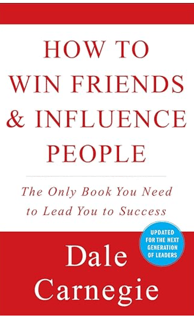The Art of Personal Connection: A Timeless Guide for Success
ARTICLE
ChatGPT-3.5
3/25/20243 min read


Dale Carnegie's How to Win Friends and Influence People is an enduring classic in the field of personal development and interpersonal communication. Originally published in 1936, it has since become one of the best-selling books of all time, offering practical advice on building relationships, enhancing communication skills, and achieving success in both personal and professional life.
Six Takeaways for Readers
In this summary, we will explore the key themes of the book and examine their enduring relevance in contemporary society.
The Power of Positive Interaction. Carnegie emphasizes the importance of positive interaction in building successful relationships. He argues that genuine interest in others, along with a friendly and approachable demeanor, lays the foundation for meaningful connections. In today's fast-paced world, where technology often mediates our interactions, the value of genuine human connection remains as relevant as ever. Carnegie's emphasis on the power of positive interaction serves as a reminder of the importance of empathy, active listening, and genuine engagement in fostering strong relationships.
The Principle of Empathy. Empathy is a central theme in How to Win Friends and Influence People. Carnegie highlights the importance of understanding others' perspectives, feelings, and needs in order to build rapport and trust. By putting oneself in the shoes of others and showing genuine concern for their welfare, individuals can establish deeper connections and strengthen relationships. In today's diverse and interconnected world, empathy is increasingly recognized as a key skill for effective communication, conflict resolution, and collaboration.
The Art of Persuasion. Carnegie explores the art of persuasion and influence, emphasizing the importance of appealing to others' interests, desires, and motivations. He argues that instead of relying on coercion or manipulation, individuals can achieve their goals by understanding and addressing the needs and concerns of others. This principle remains highly relevant today, as individuals seek to navigate complex social dynamics and persuade others to support their ideas or initiatives. The ability to influence others with integrity and empathy is a valuable skill in both personal and professional contexts.
Effective Communication Techniques. How to Win Friends and Influence People provides practical advice on effective communication techniques, such as active listening, asking questions, and showing appreciation. Carnegie emphasizes the importance of focusing on others' interests and perspectives, rather than solely on one's own agenda. These communication principles are still highly relevant in today's digital age, where effective communication skills are essential for building rapport, resolving conflicts, and fostering collaboration. Whether in face-to-face interactions or virtual communication channels, Carnegie's timeless advice on effective communication techniques continues to resonate with readers seeking to enhance their interpersonal skills.
The Importance of Leadership and Influence. Carnegie discusses the role of leadership and influence in achieving success and making a positive impact on others. He argues that effective leaders inspire trust, respect, and loyalty by demonstrating integrity, empathy, and authenticity. This principle remains relevant today, as individuals aspire to lead with purpose, vision, and ethical values. Carnegie's insights into the qualities of effective leadership serve as a guide for aspiring leaders seeking to inspire and empower others to achieve common goals.
Handling Criticism and Conflict. How to Win Friends and Influence People offers practical advice on handling criticism and conflict with grace and diplomacy. Carnegie emphasizes the importance of avoiding arguments, criticism, and condemnation, and instead, focusing on finding common ground and seeking mutual understanding. In today's polarized and contentious world, the ability to navigate disagreements and conflicts with tact and empathy is more important than ever. Carnegie's principles for handling criticism and conflict offer valuable insights for fostering constructive dialogue and resolving disputes in a respectful and collaborative manner.
Lasting Values
Despite being published more than eight decades ago, the principles outlined in How to Win Friends and Influence People remain highly relevant in today's world. In an era marked by rapid technological advancements, changing social norms, and global interconnectedness, the fundamental principles of building relationships, effective communication, and ethical influence continue to be essential skills for personal and professional success. Carnegie's timeless advice serves as a roadmap for navigating the complexities of human interaction and achieving success in an increasingly interconnected and dynamic world.
—This article was partially generated by ChatGPT (powered by OpenAI’s language model, GPT-3.5; https://openai.com). The editing was performed by Aaron Larson.
Purchase the book now on Amazon
As an Amazon Associate, I earn from qualifying purchases. This does not affect your cost. The commission comes out of Amazon's profits. Thank you for your support.


